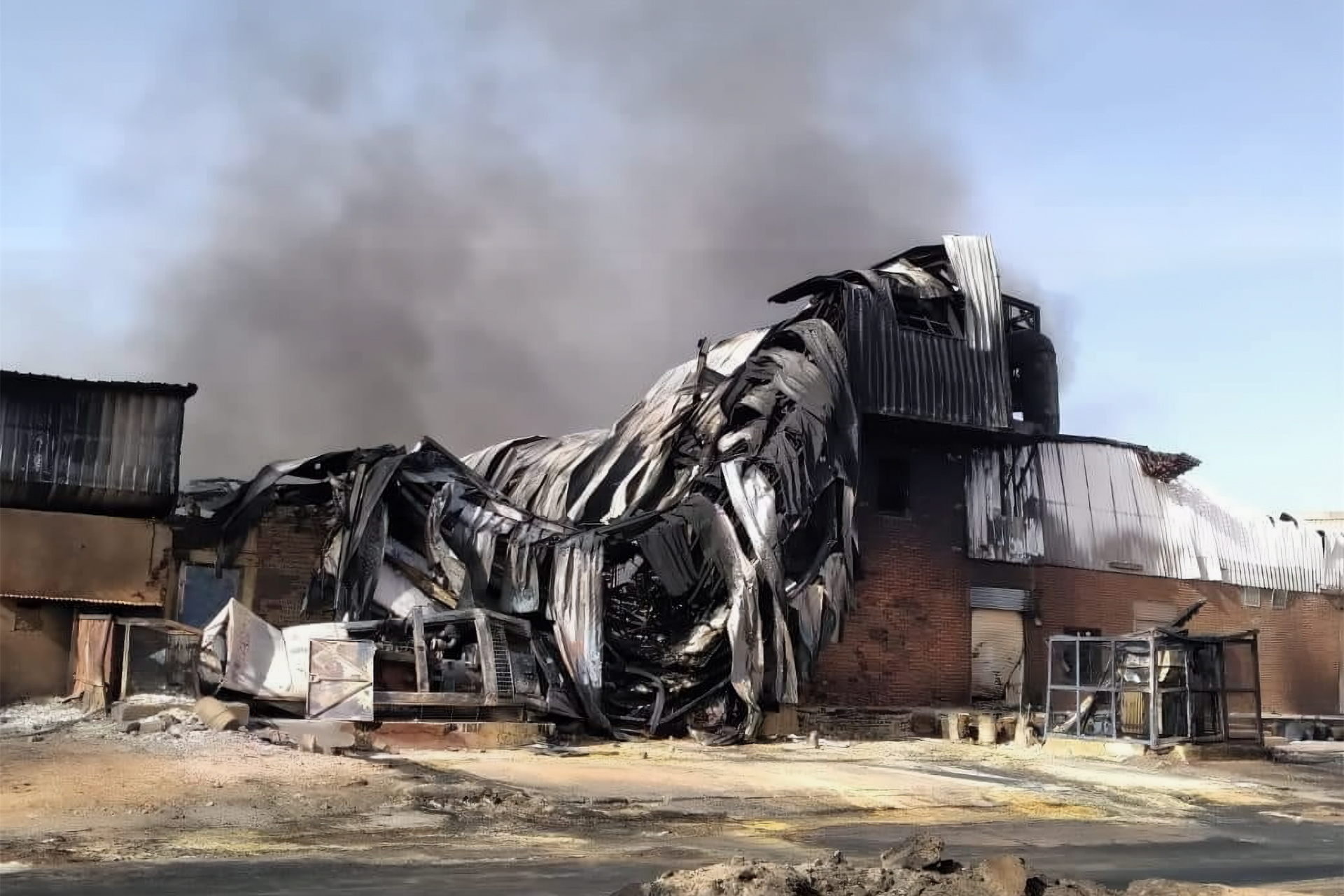A massive fire broke out in one of the most important food factories in the Sudanese capital Khartoum, against the backdrop of ongoing clashes between the army and the Rapid Support Forces, according to local media.
The effects of the destruction of the "Samil Foods" factory, which was looted and burned as a result of the current events in #السودان.
The factory is a Sudanese-French partnership, covers the needs of the country and neighboring countries for baby food, and contributes to the supply of UNICEF and the United Nations World Food Program. pic.twitter.com/LhTMFGyYUD
— Sudan News (@Sudan_tweet) May 12, 2023
Saleh Abdul Rahman Yaqoub Group of Companies announced on Friday the burning of its factory "Samil Foods" in partnership with the French "Nutriset" group, which covers the needs of Sudan and the surrounding areas.
The group posted on its Facebook page pictures that showed the burning of the factory and the severe damage caused to it, and commented on them by saying, "My pain is on you, my country, a great loss for the children of Sudan."
Samil manufactures nutritious peanut paste to address nutritional deficiencies in children, and its production capacity has increased in 9 years from 1200,10 to <>,<> tons, according to the French embassy in Khartoum.
The company said in a post circulated on digital platforms that the factory is the only one of its kind in Sudan, and denounced what it was subjected to, saying "it covered the needs of UNICEF and the World Food Program for food for children suffering from malnutrition and the risk of famine."
In turn, the French partner of the factory expressed his dismay, and said that "the factory was completely destroyed during the fighting in Khartoum," while declaring solidarity with the factory's management and staff in what he described as "difficult".
The Nutrisit group confirmed on its Facebook page that hundreds of thousands of Sudanese were reeling in a humanitarian disaster.
"Their situation is getting worse by the day in the face of the worrying food insecurity that pre-started the conflict in the first place."
On Wednesday, the United Nations World Food Programme predicted that an additional 2 to 2.5 million people in Sudan would suffer from hunger in the coming months as a result of ongoing violence in the country.
In a report, WFP warned of record levels of acute food insecurity in Sudan, reaching more than 19 million people, two-fifths of the population.
Activists denounced the burning of "Smile Food", whose name topped the Facebook and Twitter platforms, amid fears of repercussions on the food security situation in the country, which may threaten the lives of millions of children after suffering from malnutrition.
Moreover, inside this edifice, which I have had the honor to work in since 2017, there is the SAFE laboratory, which is one of the only laboratories in Sudan that have obtained the international accreditation ISO IEC 17025:2017 in the field of food analysis, the effort that went into obtaining this accreditation certificate at the request of WFP and UNICEF https://t.co/NTnfilZJ6O
— MUHAMMED IDRIS ABDALLA (@abdalla_idris) May 13, 2023
If a baby food factory is a military target of one of the warring parties, this war is all a crime. #السودان https://t.co/RAQn3wfRyk
— Fadi Al-Qadi self⁻verⁱfⁱed (@fqadi) May 12, 2023
This war destroys the planting and plowing And little by little it burns the green and the entire earth.
,, A picture of the burning of the Samil Food Factory, which is a factory that needs to be defined, especially for the resulting products.#Must_stop#No_to_war#Rapid_Support_Militias https://t.co/xQ3HZ7GU0V
— Md Syed (@MdSayed81965438) May 12, 2023
Unfortunately, the only factory I saw met all the conditions of industrial engineering, safety and health. May God compensate them well, hopefully https://t.co/9piq4z9XmF
— Mujtaba Saleh (@Tbasalah) May 13, 2023
Up to 19 million people in Sudan – 41 percent of the population – may have difficulty finding a meal a day, compared to 15 million last year.
Nearly 4 million pregnant and lactating children and women were acutely malnourished before the clashes began, according to WFP Country Director for Sudan Eddie Rowe.

